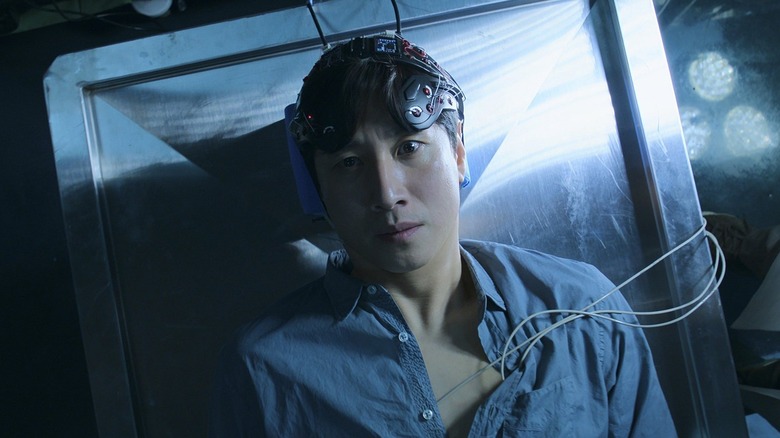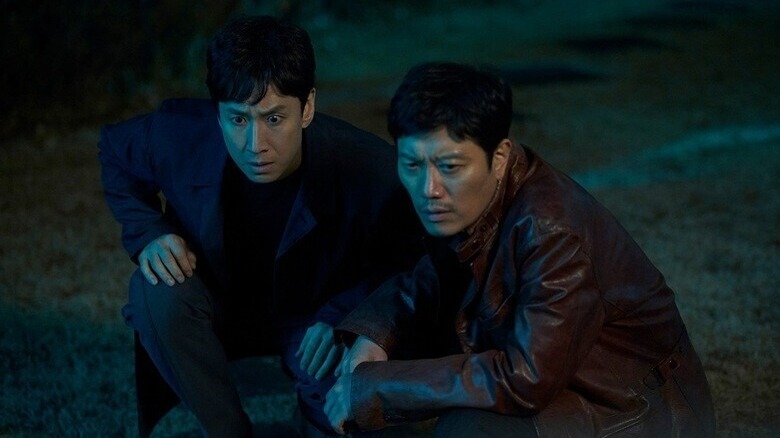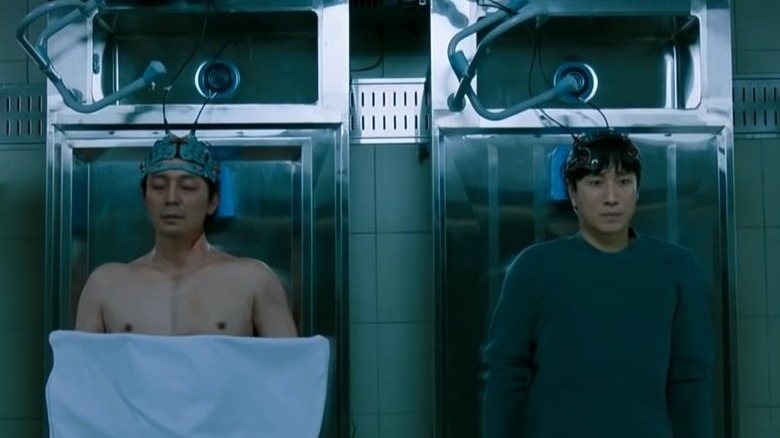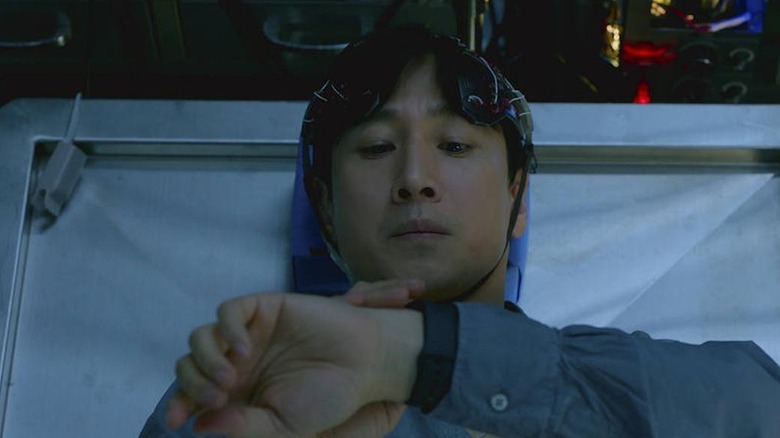Kim Jee-Woon And Lee Sun-Kyun On Deep Diving Into The Mental Darkness With Dr. Brain [Interview]
Over the last few decades, South Korean filmmakers have been putting out some of the best genre work in the world. From top-grade thrillers like Bong Joon-ho's masterful Oscar phenom "Parasite" and Park Chan-wook's stunning 'Vengeance Trilogy' (including the widely beloved "Oldboy"), to the high-end action of Lee Jeong-beom's "The Man From Nowhere" and the shocking supernatural horror of Kim Jee-woon's "A Tale Of Two Sisters," you can't count out the masterful projects emerging from South Korea. Case in point: South Korean cinema rightfully has two spots on the list of my favorite films of all time in Kim Jee-woon's "I Saw The Devil" and Bong Joon-ho's "Parasite," both modern classics.
This is precisely why the Apple TV+ sci-fi thriller "Dr. Brain" is so genuinely exciting. Created by director Kim Jee-woon from a popular webtoon and starring Lee Sun-Kyun of "Parasite" fame, "Dr. Brain" centers around Sewon, a brilliant researcher who perfects the ability to 'sync' between his own brain and others'. He uses this amazing technological ability to hack into memories and attempt to solve a mystery of his own. The catch? The mystery is deeper and wilder than he imagined, and using the technology starts to change him in remarkable yet frightening ways.
As the first Korean language original series for the streaming service, as well as genre master Kim Jee-woon's first foray into serialized television, "Dr. Brain" is a shocking high-concept thrill ride that showcases a talented director at the peak of his powers. I sat down Kim Jee-woon and Lee Sun-kyun to chat the series, its stunning visuals, the complexity of playing Sewon, and more.
As the secret of this mystery case is revealed, the secret about his personal flaws are also revealed
[To Kim Jee-woon] For this series, you added a number of complex emotional story lines and mystery in your adaptation of the source material. And I wanted to ask why was that so essential for you?
Kim Jee-woon: The most interesting part for me in the original webtoon was this story about the main character scanning other people's brains and using the clues that he picked up in their memories to solve a mystery. I wanted to take this motif and expand it into a deeper, richer story by adding multiple layers to it, so I thought about how interesting it would be if this person found out more about himself through the eyes of other people.
Koh Sewon is born with a brain anomaly which makes him very reclusive from society. He's shut off completely and he doesn't really get along well with other people, but he learns about his flaws by connecting with other people's brains and their memories. It's very ironic in that, as the secret of this mystery case is revealed, the secret about his personal flaws are also revealed. So once he confronts his flaws, he tries to address them and recover and restore the connections that he had previously lost with the people around him and with society. I thought that I could pull off that story about reconciliation and recovery, and that's really the reason why I wanted to adapt it into a series.
[To Lee Sun-Kyun] Can you talk a little bit about your collaboration process with Director Kim?
Lee Sun-Kyun: Yes. Well, actually the biggest reason why I chose to work on this show was because I have always been such a big fan of Director Kim since I was young. This was like a dream come true for me as an actor to be able to work together with him. I always find Director Kim to be very sophisticated, very cool and very unique. Director Kim is not a young man anymore, but he is still so trendy in his works and he works really hard to keep that trendiness. I really admire him in that aspect.
We were worried that they might have trouble catching up with his emotions
[To Kim Jee-woon] What was the process like to write a character that starts out with relatively little emotion, but then evolves so much emotionally over time?
Kim Jee-woon: That was the part that was very important for both me and Lee Sun-Kyun. We consulted very closely on crafting that sort of a character. Koh Sewon has a brain anomaly where his hippocampus is very large, which gives him an excellent memory but an underdeveloped amygdala, so he's very much struggling with connecting with others and he shut off from society and basically isolated. The thing about the main character is that the audience tries to follow his point of view, but since the main character didn't really show much emotion in the initial part we were worried that they might have trouble catching up with his emotions.
We thought a lot about whether they would be able to catch up [and] track his emotions. Originally in the script Koh Sewon was supposed to start feeling more emotions towards the latter part of the series, but we pushed it up a little bit because we thought that he was a bit too icy, and we were like, 'we should heat it up a little bit. Let's bring the temperature up a little bit, a bit more warmth for him.' So that way, me and Lee Sun-Kyun really closely communicated to craft the character in a way that the audience could connect to him eventually.
[To Lee Sun-kyun] Your takes the unique journey of starting rather emotionless and then gaining emotional complexity, while so many other characters do the reverse. Can you tell me about that?
Lee Sun-kyun: I think that's a very good question, Jeff. I never thought about it that way, but I think you have a very good point. It actually goes backwards compared to other dramas or films. Well, when I was portraying Sewon, after he learns of these new feelings through brain syncs, he's very confused and he feels that he's at fault for the tragedies that happen around him. This kind of feeling, this confusion and this becomes another driver for him to move forward, I think that was both a challenging part and a fun part as well.
[To Lee Sun-kyun] What fellow member of the cast do you feel you had the most onscreen chemistry with?
Lee Sun-kyun: All the cast were great, especially for Kangmu, played by Park Hee-Soon. We go way back. We are friends for 20 years plus, so I felt very comfortable around him. And I would also like to thank Lee Jae-Won, who played the role of Dr. Hong. He was the only witty and relaxed character in the whole dark and heavy series. I think my chemistry with all of them are great, but especially with Dr. Hong and Kangmu.
We're going to dive deep into the very dark aspect of that person's mind
[To Kim Jee-woon] The series has a number of very surreal dreamlike experiences and scenes, often quite scary. What was your process of coming up with the visual design for those scenes?
Kim Jee-Woon: Well, for starters, since we're peeping into the human brain, which means that we're going to dive deep into the very dark aspect of that person's mind, I wanted to portray how tense it would be, the outcome of brain scanning. I also wanted to highlight the horror elements in the first episode in particular. So, as for the creature scenes, the mise en scene would be centered around a horror-related vibe. And since I wanted to piece together the very fragmented, inconsistent and uneven pieces of memories, I tried to focus on that also, and I deployed a lot of different filmmaking techniques like going from a long shot to suddenly a wide angle and vice versa. I also wanted to highlight that very confusing aspect of [it all], which could also be associated with the side effects of brain scanning, that gave off that horror film related vibe.
And this person, the main character, who is socially isolated and shut off from other people, as he gets closer to the truth of the mystery, he starts feeling more emotions. I wanted to depict this through the change in the color scheme. So in the beginning, I used a monotonous blend kind of color palette. And towards the end, as Koh Sewon started to feel a wave of emotions, I added more vivid intense colors, especially the color red, since it was instinctually an emotional color for me.
What makes Dr. Brain especially interesting for me is that you can find hints of all kinds of different genres across the series. For instance, when the truth of the mystery is revealed, there's a suspense and thrilling element. When the person behind everything pulling the strings is uncovered, you can see that prime genre-related element. And as the main character is clashing with the people at the other end, there's the action sequences and also there's the humanistic element related to people relationship and how those connections are restored and recovered. I tried to maintain that underlying baseline of a mystery thriller ambience, but in each and every episode you can see a touch of different genres. I think this is what sets Dr. Brain apart from other shows.
[To Lee Sun-kyun] With such a dreamlike, sometimes frightening and surreal story, does that make it more difficult to get into character? How did you overcome that?
Lee Sun-Kyun: Actually no, it wasn't difficult at all. When I was reading the script, I actually really enjoyed the dreamlike and the surreal parts of it. I was very curious about how Director Kim would make this into a scene and how it would turn out. So it actually, I think, helped me in getting into character. I think those scenes really would help the audience as well in following his flow of emotions.
[To Lee Sun-kyun] What was the most difficult or interesting scene to film or set experience that you had?
Lee Sun-Kyun: The most challenging was trying to decide on to what extent Sewon will be emotionless and also to what extent I would portray the characteristics of the people that I brain synced with. The [most] fun scenes were the action scenes after I brain synced with a cat. I had cat-like abilities and then I had these action sequences, I think they were really fun to shoot.
"Dr. Brain" is currently streaming on Apple TV+.



